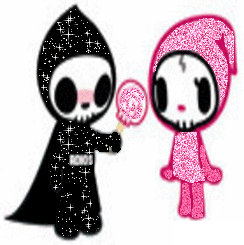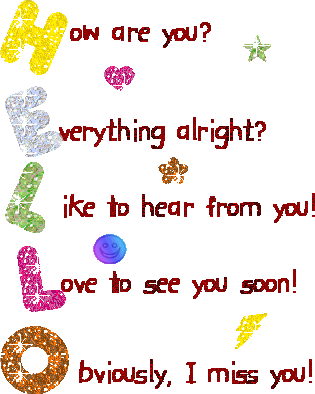skip to main |
skip to sidebar
Procedure text is designed to describe how something is achieved through a sequence of actions or steps. It explains how people perform different processes in a sequence of steps. This text uses the simple present tense, often the imperative sentences. It also usually uses the temporal conjunctions, such as first, second, then, next, etc.

MyNiceSpace.com
The structure of a procedure text consists of :
1. Aim/ goal (or title).
2. Materials (not required for all procedure texts).
3. Steps.
However, there is a procedure text that only consists of goal and followed by some steps.
Example :
THE BASIC OPERATION OF A DIGITAL CAMERA
You need :
1. a digital camera.
2. an object (a friend/ classmate or something interesting you can find around the classroom or school yard)
Follow the steps below to take pictures!
1. Hold up the camera and center the object in the LCD.
2. Move closer or use the zoom control for the result you want.
3. When you’re ready to take the picture, hold the shutter halfway. It is very important, so the camera sets the focus, shutter speed, and various other calculations. This may take a few seconds.
4. A light should appear that lets you know the camera is set to go.
5. Press shutter all the way down.
It may be necessary to turn off the LCD and use the view finder when there is extreme sunlight or to conserve battery life. The glare from the LCD does not work well with bright light..

MyNiceSpace.com
Narrative text is story to explain a myth, legend, folktale, and folklore. The purpose is to entertain the readers.

MyNiceSpace.com
Example :
PRINCESS MANDALIKA
Once upon a time in Lombok, there was a kingdom named Kuripan. The king of Kuripan was very wise. He had a daughter, named Mandalika. She was so beautiful. Many princes wanted to marry her. To choose the one that would be his son- in- law, the king had an arrow shooting competition. The best one would be Mandalika’s husband.
On the day of the competition, those princes shot their arrows. All of them did it perfectly. The king found it difficult to fight and kill each other.
Princess Mandalika was so desperate. She didn’t want anyone killing each other because of her. That’s why she decided to go to the sea. She died in the south sea of Lombok. The king and princes were sad and felt guilty. They regretted and stopped fighting. 30
Until now, one day in every year, usually in February or March, people go to the south sea. On that day, a great number of worms come out from the sea. People call these worms nyale. People believe that those nyales are Princess Mandalika’s hair.

MyNiceSpace.com
Recount Text is the story to tell about a sequence of events, all of which relate to a particular person. The recount generally begins with an orientation. It gives the readers the background of information needed to understand the text (who was involved, where it happened, and when it happened).
Then, the recount unfolds with a series of events (ordered in chronological sequence). At various stages there may be some personal comment on the incident. We call it re- orientation.

MyNiceSpace.com
Example :
EARTHQUAKE
The day when I went home from office was a terrible day. I was driving along the coast road when the car suddenly lurched to one side.
At first I thought a tire had gone but then I saw telegraph poles collapsing like matchsticks which flashed and burnt.
The rocks that tumbled across the road almost hit my car and I tried to abandon it.
When I got back to town where many people crowded o the road, I saw some houses collapsed, the bridge had a crack, and the people said that the earthquake happened a few minutes ago.
Fortunately, the earthquake did not collapse my home and I thanked God.

MyNiceSpace.com
Simple present is change at verb form which refer to the happen event repeatedly, often, every day, is a hobby and is general really. Be characterized by every day, every Sunday, every month, every year, every week, etc.

MyNiceSpace.com
Simple present Structure at positive form :
I/ You/ We/ They + Verb 1 + o/c
Simple present Structure at negative form :
S + To Be + not + o/c, or
I/ You/ We/ They + Do + not + Verb 1 + o/c
She/ He/ It + Does + not + Verb 1 + o/c
Simple present Structure at interrogative form:
To Be + S + o/c + ?, or
Do + I/ You/ We/ They + Verb 1 + o/c + ?
Does + She/ He/ It + Verb 1 + o/c + ?
Simple past is time form use for to explain a action or event which happen at last time (simple characteristic) and not contact with now form and happen time. Be characterized by last week, yesterday, last years, ago, last Sunday, etc.
Simple past Structure at positive form :
S + Verb 2 + o/c
Simple past Structure at negative form
S + To Be (was/ were) + not + Verb 2 + o/c, or
S + did + not + Verb 1 + o/c
Simple past Structure at interrogative form :
To Be (was/ were) + S + Verb 1 + o/c, or
Did + S + Verb 1 + o/c

MyNiceSpace.com
Announcement is a pronouncement about something, (generally to announce for people and lost something).

MyNiceSpace.com
Examples :
Attention, shoppers! May we have your attention, please?
We have found a lost boy named Jack.
We found him in the toys and accessories section of our store, and he’s looking for his parents. He’s about seven years old. He’s wearing a red shirt, trousers, and a red cap. The boy is with us now at the check- out counter at the main exit. Thank you.
White male cat, named Justin. Lost on Tuesday, 2nd of September 2008 at Simpang Lima. If found, please call 00008888123. (Reward will be given)

MyNiceSpace.com
Giving instructions is a sentence that used to give instruction to other people for them to do something.

MyNiceSpace.com
When the commanding word is a verb, we use the infinitive without to. Look at the examples!
a. Stand up!
b. Boil the water before you drink it!c. Drink your tea!
c. Clean the kitchen!
d. Wash your dirty clothes!
If we do not use a verb as the commanding word, we can use be+ adjective. Look at the examples!
a. Be quiet
b. Be happy
c. Be careful
d. Be a good pupil
e. Be yourself
When we forbid someone to do something, we use the word don’t + verb infinitive without to. Look at the examples!
Don’t go!
Don’t be silly!
Don’t throw the detergent onto the toilet!.
Don’t look at the sun directly!
Don’t put your food uncovered!
We often put the word “please” at beginning or at the instruction. We use it in order to make the word sounds more polite or soft.

MyNiceSpace.com
How to gain people attention orally is a sentence that used for call for a gain attention of some people.

MyNiceSpace.com
If you want to gain attention of some people, you can use :
a. Attention, please..!
b. Listen to me, please…!
c. Excuse me…!
d. Look here!
e. May I can I have your attention, please…?!!
PRACTICING THE DIALOGUES:
Adul : Attention please, guys!! I want to explain about how to gain people attention orally!
Al Amin: Listen to me please…! This is very important. You all must know!

MyNiceSpace.com
Expressing sympathy is feel which say sympathy because something to do ourselves, someone, or other people.

MyNiceSpace.com
EXPRESSING OF BEING SYMPATHY (LESS SERIOUS NEWS)
Oh no!
What a pity!
What a shame!
What a nuisance!
Poor you.
EXPRESSING OF BEING SYMPATHY (VERY SAD NEWS)
How awful!
How terrible!
I’m really sorry to hear that.
That must have been awful!
I’d like to express my deepest condolences.
PRACTICING THE DIALOGUES:
Christina : I lost my watch last night.
Aguilera : I’m sorry to hear that!
Christina : Thanks for your sympathy.

MyNiceSpace.com
Expressing happiness is feel which say happy because something to do ourselves, someone, or other people.

MyNiceSpace.com
EXPRESSING HAPPINESS
I’m so happy for you
I’m happy to hear that!
I’m glad to know that.
My happiness for you.
My deep impression for you both.
It’s great.
PRACTICING THE DIALOGUES:
David : I bought this new dress.
Beckham : It’s a beautiful dress.
Tom : My sister got the first prize at the festival.
Cruise : It’s great!
Angelina : I got nine for English!
Jolie : I’m happy to hear that.

MyNiceSpace.com
Making appointments is a promise that is made by someone in his/ her life to someone or other people.

MyNiceSpace.com
MAKING AN APPOINTMENT BY TELEPHONE
Urip : I’d like to speak to Ms. Artalita, please?
Operator : Yes, just a minute please.
Artalita : Could I talk to Mr. Untung, please?
Untung : Yes, I am Mr.Untung.
Untung : May I chat to Al Amin Nasution, please?
Al Amin : Yes, I am Al A min.
ASKING FOR AN APPOINTMENT….
Would I be able to make an appointment to see Jay Z, please?
Could I make an appointment to see Lily Allen, please?
Can I make an appointment to see Marilyn Manson, please?
May I make an appointment to see Demi Moore, please?
SUGGESTING AN APPOINTMENT
A : Would you be able to come on Saturday at five o’clock?
C : Yes, that’s fine.
B : Can you come on Sunday at 10:30?
D : Oh, I’m sorry because I’m not free at the time.

MyNiceSpace.com
How to invite people orally or invitation is expression of to urge someone or other people.

MyNiceSpace.com
MAKING AN INVITATION
I’d like to invite you to come to my birthday party.
Are you free on Sunday morning? Would you like to jogging with me?
I was wondering if you’d like to come to my new home this afternoon.
We’re going to have a religious meeting tonight; we’d love you to come.
THIS IS AN INVITATION FOR PARENT OR STRANGE PERSON...
Would you like to go to cinema with me tonight ?
Would you like +to + V 1 + o/c ?
ACCEPTING AN INVITATION
Thank you. I’d love to.
Yes, thank you. What time?
Sounds great.
That would be wonderful.
Okay.
All right.
I’d love to, thanks. Where do you want to meet?
I am glad be able to accept.
That’s a good idea. What time do we go?
I will. Thanks for your invitation.
REFUSING AN INVITATION
Unfortunately, I won’t be able to come because I have made plans.
I’m sorry, I’m unable to come because I have to go up town.
I’m afraid I won’t be able to accept because I have a business.
Sorry, I can’t because I must be going now.
I’m awfully sorry, I have other plans.
Sorry, I’ve already made plans for Saturday.
Oh darn!! Have to fetch the doctor. My sister is ill.
I wish I could, but I have promised to go with my friend to downtown.
I’d really like to, but I have to finish my job first.

MyNiceSpace.com
Greeting is the expression which is used to address someone or other people.

MyNiceSpace.com
How do you greet other people ??
1. Good morning / afternoon/ evening/ night.
2. Hello…
3. Hi…..
4. How are you?
I’m fine, thanks. 1
So far so good.
I’m Ok.
I’m well.
So fine.
5. How’s everything with you?
Couldn’t be better.
6. How’s life?
7. How are you getting along?
8. How are you going?
Fine, thanks.
Pretty good, thanks.
I’m well, thanks.
Not bad, thanks. And you?
9. What’s up?
Give me five (tos tangan)
Give me a hug (rangkulan)
10.How do you do? (use when first meet new)
How do you do? (harus menjawab how do you do jika ditanya how do you do)
How do you introduce yourself??
Let me introduce myself, my name is Arum Trividiati …..
Hello, I’m Arum Trividiati ….
Hi, I’m Arum Trividiati. You can call me Arum.
Hello, my name is Arum Trividiati ….
How do you introduce other people?????
a) I would like to introduce Justin Timberlake.
b) I would like you to meet Beyonce.
c) Excuse me, let me introduce you a new friend. His name is Gwen Stefanni.
d) This is a friend of mine, Madonna.
How do you end your conversation?????????
Well, I should be going now. See you.
I’m sorry, but I have to go now. It’s been nice talking with you. See you later..
Well, I must be off now. I’ll talk to you later!
Ups.., look at the time! Sorry, I can’t chat right now. I have to go.
The finally word of conversation…
See you later/ tomorrow/ next week, etc..
Have a good time.
Good bye..
Bye bye..
Be careful, take a care.
Good bye, make a call, will you?

MyNiceSpace.com














